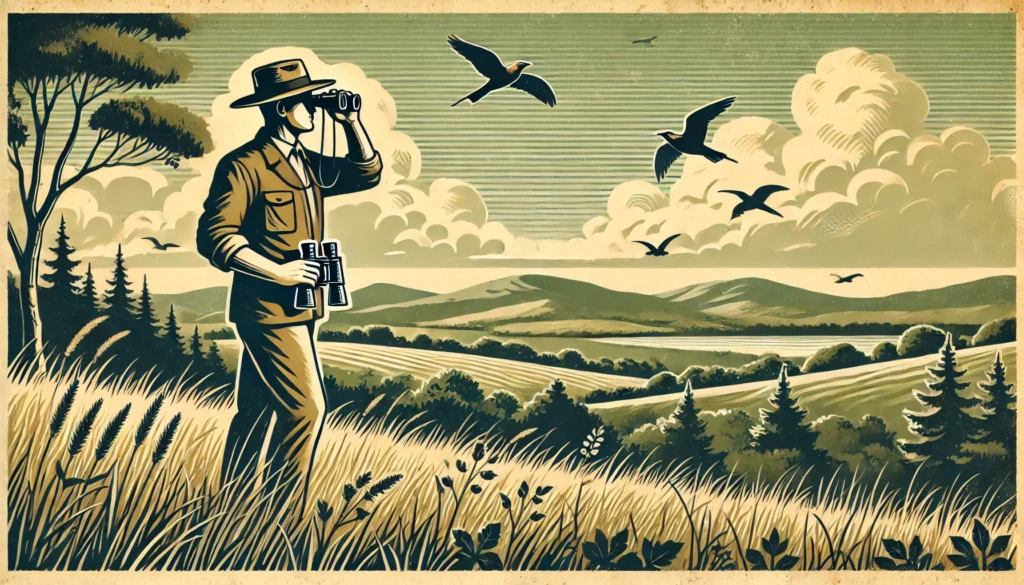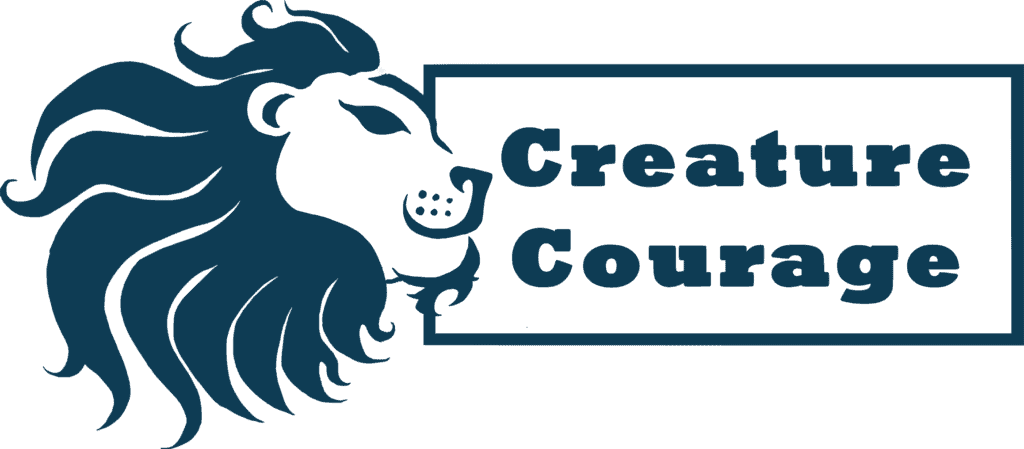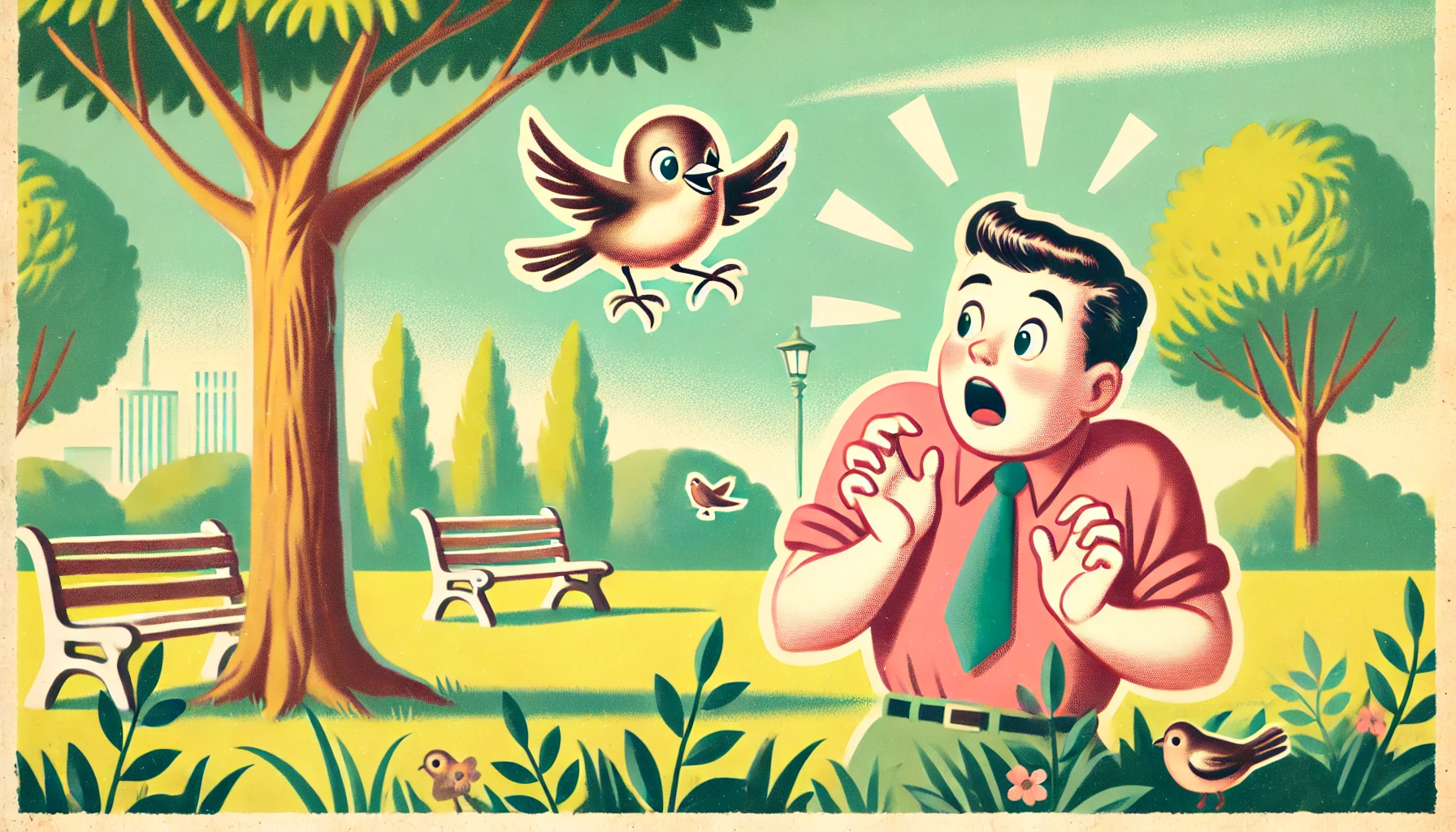The Fear of Birds: Ornithophobia
For many, the sight of a bird soaring gracefully across the sky or waking to the melodious chirping of songbirds brings joy and a real sense of connection to nature. Yet, for those suffering from Ornithophobia – the fear of birds – these experiences can trigger intense anxiety and distress.
Ornithophobia is more common than you might think: this phobia can range from mild unease to a debilitating panic, but what causes such a fear of birds, and more importantly, how can we overcome it?
Find Out How to Overcome Your Fear of Birds with Creature Courage
How Bird Phobias Are Formed?
Let’s dive straight into it, a fear of birds often stems from childhood experiences: a startling encounter with an aggressive bird, witnessing a bird attack (in person but sometimes seeing an attack in a movie can be enough), or even observing a parent’s fearful reaction to birds can plant the seeds of this phobia. For some, it’s not the birds themselves but specific aspects of them that trigger fear – the unpredictable flapping of wings, the texture of feathers, or finding their darting eyes unsettling.
- The fear of flapping wings is a common aspect of Ornithophobia. Many people find that what they perceive as a sudden or erratic movement of a bird’s wings is alarming, especially when unexpected or up-close. This specific fear might be rooted in our evolutionary past, where sudden movements more often signalled danger, which could be catastrophic
- A fear of feathers (so triggering in people that it has its own name – Pteronophobia) cannot help but be intertwined with the fear of birds, and adds an extra layer of complexity to the phobia. The texture or sight of feathers might be responsible for triggering disgust or anxiety in many individuals
Which Birds Are People Most Afraid Of?
Any birds can trigger Ornithophobia, but some species have been found to elicit stronger reactions:
- Pigeons: Often abundant in urban areas, OK, let’s face it, they’re pretty much everywhere. Plus, their tendency to flock in large numbers and their usual bold behaviour around humans can be overwhelming for the most relaxed of people. It’ll come as no surprise that these birds are the most anxiety-inducing and phobia-inducing
- Geese: People often cite geese for their aggressive behaviour, without appreciating or thinking about why. Geese typically lay eggs in the early spring, with eggs hatching around a month after. So, if you stumble across an aggressive goose in these months, it’s probably because they are protecting their young
- Seagulls: Chips beware! Seagulls are associated with dive-bombing for food, especially known for swiping chips from the packet as you walk along the seafront. Understandably, this behaviour can be rather startling
- Large birds of prey: Eagles, hawks, and, indeed, owls can trigger fear due to their size and predatory nature. Like many animals, myths abound about these bigger birds, but they are often untrue or massively exaggerated
- Roosters or other loud birds: Their sudden, loud calls can be jarring for some people. Also, roosters can be territorial and attack if you get too close to their hens. Though these attacks are usually harmless, they can be scary!

Is a Fear of Birds Rare?
While exact statistics vary, Ornithophobia is not as rare as you might think. Sure, birds are ever-present in our daily lives and you might think that familiarity is enough to rule out anyone truly developing a phobia. They can be a nuisance, for sure, but lots of people are developing a real fear, is that true?
The fear of birds falls under the category of specific phobias, those that affect a significant number of the population. Some studies suggest that animal phobias, of which the fear of birds is included, may affect up to 5% of the general population – that’s around 3 million people in the UK. If all this is striking a chord with you, though there are online phobia tests that can provide some sort of initial insight, a proper diagnosis should always come from a mental health professional. See your doctor in the first instance if you need to get your suspicions confirmed.
The Fascinating World of Birds
Understanding birds can be a powerful tool in overcoming fear – it’s what we at Creature Courage recommend for all animal phobia treatment. Birds are an incredibly diverse and important part of our ecosystem, with over 10,000 species worldwide. They range from tiny hummingbirds weighing less than a penny to massive ostriches standing taller than most humans.
Birds play crucial roles in our environment:
- Seed dispersal: Many birds eat fruits and spread seeds through their droppings, which helps to maintain and regenerate forests – of course, it doesn’t work so well on pavements!
- Pollination: Hummingbirds, sunbirds, and many others are important pollinators, crucial for plant reproduction.
- Pest control: Many birds eat insects, helping to naturally control pest populations, without the need for pesticides that can harm the soil and have been attributed to causing cancer.
- Ecosystem balance: Birds of prey help control populations of small mammals and other birds.
- Scientific research: Bird migrations have helped scientists understand global weather patterns and climate change.
As much as we have adapted to live alongside and use birds to our benefit, so have birds. In cities, pigeons, sparrows, and starlings thrive, often foraging on our waste – or stealing our chips, as we’ve discussed! Suburban areas attract robins, blue jays, and cardinals, often feeding from the feeders many of us leave hanging in our gardens. Away from these easy pickings, some birds, like Arctic terns, make incredible migrations: flying from the Arctic to the Antarctic and back each year! That’s a round trip of about 70,000 kilometres. It’d take the average passenger jet 4-5 days to complete such a journey!
This diversity and adaptability of birds has made birdwatching a popular hobby worldwide. Birdwatchers, or “birders,” find great joy in observing and identifying different species, appreciating their colours, behaviours, and unique birdsong. This hobby can be a great way to connect with nature and find peace in our often hectic lives, whilst giving you a great new perspective on the lives of birds.

How to Overcome the Fear of Birds
If you’re struggling with Ornithophobia, know that there is hope. Learning how to overcome a fear of birds is a journey, thankfully not quite as long as the Arctic Tern’s. We will provide you with the right tools and support to see you overcome your fear and improve your all-around confidence for birds and any other animal or situation. It’s entirely possible, and here are some of the strategies we are confident will lead you to freedom from your fear:
- Education: Learn about birds, their behaviours, and their importance in our ecosystem. Understanding often reduces fear, and visiting local nature centres, joining online bird-watching groups, or taking the time to watch them in your garden can all help in your progression to overcoming your phobia
- Exposure: Start small, look at bird pictures, and get used to the image in front of you. When you feel comfortable, move on to videos or nature documentaries, and gradually work up to observing birds from a safe distance, either behind a window or in the great outdoors. Remember, you don’t need to go through this process alone; asking friends and family for support is always what you should do first
- Relaxation Techniques: Practise deep breathing, progressive muscle relaxation, and mindfulness meditation to manage anxiety symptoms when encountering birds. These techniques help calm your body’s stress response and avoid panic
- Cognitive Behavioural Therapy (CBT): This type of therapy can help you challenge and change negative thought patterns about birds. A therapist can guide you through identifying irrational thoughts and replacing them with more balanced ones.
- Virtual Reality Exposure: Some therapists use VR as a step in creating controlled bird encounters, allowing you to face your fears in a safe environment. This can be particularly helpful for those with severe phobias.
- Professional Help: Consider seeking help from specialists like Creature Courage, who offer targeted therapy for animal phobias. We provide personalised strategies and support throughout your journey.
- Positive Associations: Try to create positive experiences with birds. This might involve feeding birds from a distance (pour birdseed on a path in a park and retreat to what you feel is a safe distance) or engaging in bird-related art or crafts.
Find Out What Techniques Could Work For You
Remember, overcoming Ornithophobia is not about eliminating all fear, but about managing it effectively. With time and practice, you can learn to coexist peacefully with our avian neighbours, perhaps even finding joy in their presence.

Creature Courage Can Cure Your Bird Phobia!
If you’re ready to spread your wings and fly free from the cage of Ornithophobia, reaching out for professional help is likely to be a game-changer. Businesses like Creature Courage specialise in helping people overcome animal phobias, offering you a personalised strategy to conquer your fear of birds. With our guidance, you can transform your relationship with the feathered world, opening up new possibilities for enjoying outdoor spaces and nature.
Don’t let a fear of birds clip your wings. Take the first brave step towards freedom today, and soon you might find yourself soaring above your fears, ready to embrace the beauty of birds and the world they inhabit – your world.
Contact Creature Courage Today
FAQ
- Can ornithophobia develop suddenly in adulthood? While ornithophobia often develops in childhood, it can appear suddenly in adulthood, usually triggered by a traumatic experience with birds or a period of high stress.
- Are there any medications that can help with ornithophobia? While medication isn’t typically the first line of treatment for specific phobias, anti-anxiety medications might be prescribed in severe cases to help manage symptoms. Always consult with a healthcare professional for personalised advice.
- Can I overcome ornithophobia on my own? While self-help techniques can be beneficial, seeking professional help is often the most effective way to overcome ornithophobia, especially if it significantly impacts your daily life.
- How long does it take to overcome ornithophobia? The time it takes to overcome ornithophobia varies from person to person. With professional help, some people see significant improvement in a matter of weeks or months, while others may need longer.
- Can ornithophobia be completely cured? While “cure” might not be the right term, ornithophobia can be effectively managed to the point where it no longer significantly impacts your life. Many people who undergo treatment find they can coexist comfortably with birds.
- Is it normal to be afraid of birds after being attacked by one? Yes, it’s normal to develop a fear response after a traumatic experience with a bird. However, if this fear persists and interferes with your daily life, it may have developed into ornithophobia, and seeking help would be beneficial.



